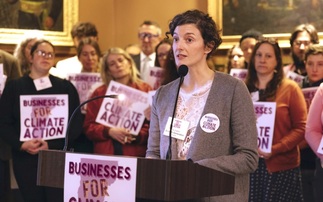
Could the COP27 prove more important than last year's Glasgow Summit? Next week's Summit in Egypt matters in ways that even many of the participants appear to have not yet grasped
Is the COP27 Summit that kicks off in Sharm El Sheikh this weekend the most important COP meeting yet, and therefore one of the most critical gatherings in the entire history of humanity?
In some ways this is an absurd contention. The Paris Summit in 2015 was a genuine turning point in the world's response to the climate crisis that will define the century one way or another, and as such it should be remembered by historians as an event of global import. You can make a compelling case that last year's COP26 Glasgow Summit was similarly critical, given it finalised the rules of the Paris Agreement and established a new pact requiring countries to assess and ideally update their national climate action plans annually. It was the meeting that, in the words of COP26 President Alok Sharma, kept the 1.5C goal alive, even if its pulse was weak. But next week's Sharm El Sheikh Summit lacks the grand diplomatic goal that governments faced in Glasgow and Paris, or Copenhagen and Kyoto before that. It is, by the admission of the Egyptian hosts, an "implementation COP".
However, there is a very real risk that the epoch-shaping importance of COP27 is being missed, even by some of those participating.
Firstly, every COP is by definition the most important COP ever, up to the point when global emissions are consistently falling at a rapid rate and the world is mobilising trillions of dollars to fully decarbonise the global economy and enhance the climate resilience of our societies.
There is a school of thought, ascribed to by certain environmental activists and climate sceptics alike, that COPs are a distraction, an exercise in jet-setting greenwash. But while the process is certainly flawed and frustrating it is hard to envisage how nearly 200 countries can rapidly transition toward net zero emissions without some kind of forum to discuss the challenges and barriers to progress, negotiate the various trade-offs and costs, and help ensure the benefits shared. If COPs did not exist you would need to invent them.
And given they exist, they matter. There is immense value in governments and businesses coming together once a year to publicly discuss this still badly underreported crisis. With global emissions still rising and national climate strategies still far too weak to deliver on the goals of the Paris Agreement every opportunity to honestly engage with the scale of the threat, to catalyse bolder action, to mobilise more investment has to be seized. Given the crisis is worse this year than it was last, this Summit is even more important than last year's. The same will be true next year, and the year after that, and so on. Until, that is, net zero emissions are finally within reach.
Secondly, the genuine but underappreciated breakthrough achieved in Glasgow last year means this year's Summit has a particular responsibility to live up to. If it does so, it could unleash an exciting new era of unprecedented climate action. If it fails, it could throw the future of the Paris Agreement and the entire COP process into jeopardy. That is what is at stake.
The details may be so labyrinthine to defy simple explanation, but the finalisation of the Paris Agreement rulebook at COP26 overcame numerous deadlocks, brought to an end six years of intense negotiations, and enabled the full implementation of the Treaty that provides the framework that should help drive global decarbonisation over the coming decades. The parallel agreement of the Glasgow Climate Pact strengthened the Paris Agreement further, by calling on countries to strengthen their national climate action plans still further, explicitly demanding a phase down of coal power, and providing the foundations for the next phase of negotiations on climate finance and how to help climate vulnerable countries cope with climate-related loss and damage.
As such, the UN climate negotiations will enter an entirely new phase next week, and what that phase entails is very much up for grabs.
There is a very real risk that without the clear diplomatic focus of a new treaty to work towards - something the talks have had pretty much uninterrupted since their inception - the COP process could lose much of its political power and its media pull. There is a danger that the somewhat vague goal of "implementation" could translate into a lack of clarity over precisely what negotiators are trying to achieve. Add in the current geopolitical tensions and the completely understandable frustration among developing countries over richer nations' failure to live up to climate finance promises and the chances of both an ill-tempered diplomatic deadlock and a creeping sense of irrelevance cannot be ruled out.
Equally, the opportunity is there for countries to come together and remake the process in a way that injects much needed momentum into the implementation and delivery of the Paris Agreement, providing a template for all future COPs to follow. The finalisation of the rulebook could and should free governments and negotiators up to use the framework it now provides explore how to rapidly accelerate the roll out of clean technologies and climate resilient infrastructure.
That means negotiating swiftly and in good faith to deliver both a new climate finance settlement beyond 2025, a huge boost in climate adaptation funding, and a formal Loss and Damage financing mechanism. But it also means delivering Just Transition Partnerships that can mobilise investment in the decarbonisation of emerging economies, removing barriers to the deployment of proven low carbon infrastructure, delivering on promises to protect forests and tackle methane emissions, creating the enabling conditions for corporate investment in emerging clean technologies, and remaking the global financial regulatory system and the role of multilateral development banks to switch investment flows from high to low carbon infrastructure. Perhaps above all, it is an opportunity for governments to use the global platform COPs provide to emphasise to investors, businesses, and the public that the fossil fuel age is drawing to a close and the net zero transition is inevitable, accelerating, and to everyone's benefit.
In his fascinating thought experiment of a novel, The Ministry for the Future, Kim Stanley Robinson places the Paris Agreement and the COP process right at the heart of the humanity's eventually successful response to the existential threat the climate crisis poses. It unlocks an age of financial and regulatory innovation, rapid decarbonisation, and negative emissions innovations that after years of violent turmoil and multiple visceral tragedies allows nations to come together to stabilise temperatures and restore the biosphere.
As the first meeting in what should be a new era for the COP process, COP27 is the first Summit to try and answer the question of how to turn such a future from sci-fi vision to geopolitical reality. At a time of acute global crisis and worsening tensions, COP27 is about implementation, but it is about a whole lot more besides. It has the potential to define the shape and direction of the only global negotiations for averting climate catastrophe over the course of a decade that will ultimately determine whether the world warms by less than 2C this century or instead triggers runaway warming and all that comes with it.
It is, by any measure, one of the most important meetings in the history of human civilisation.









